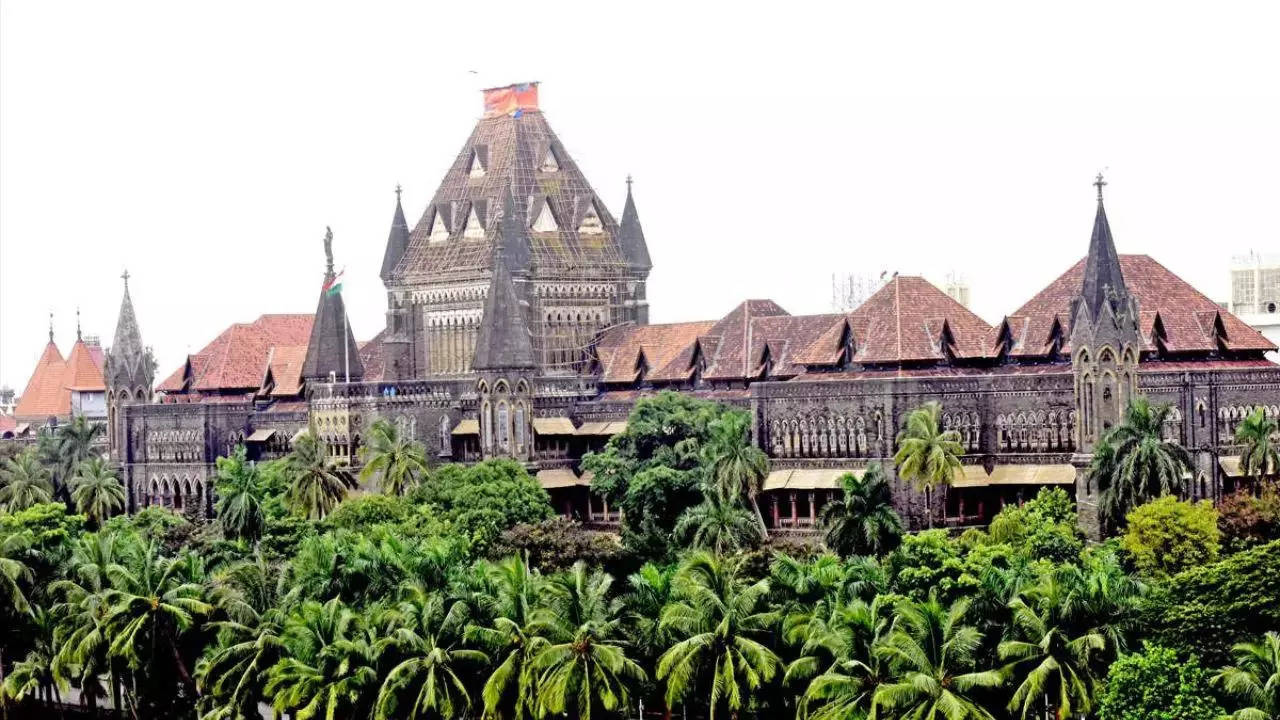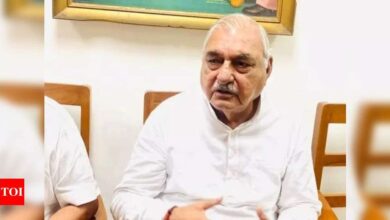India
Coercing accused to issue DDs to police towards recovery for complainant has no sanctity: Bombay HC

[ad_1]
MUMBAI: Observing that the procedure adopted by the LT Marg police station officers had no sanctity of law and showed their high-handedness, the Bombay High Court said forcing an accused to hand over three demand drafts to the police towards recovery of amount for the complainant is not the way to effect recovery.
A father and son were accused of cheating a man and when the son was arrested and in police custody, the father said the police demanded RS 15 lakh in demand drafts in the name of the police officer.A magistrate in November 2021 directed police to hand over the demand drafts to the complainant. The HC set aside the magistrate’s order last month saying it was unworkable as the DD’s were encashed. The police said they had no interest in the money but had given it to the complainant.
Ankit Jain and two others accused in August 2020 in a cheating and criminal conspiracy FIR lodged at LT Marg police station in Mumbai had petitioned the HC in 2021 to challenge the Magistrate’s order. The FIR alleged they had induced the complainant to invest over Rs 40 lakh in a computer products supply business, who then alleged he suffered a loss of Rs 88 lakhs.
One accused, Deepak Jain, said his son was arrested, and he had not been voluntarily but “under duress’’ –since his son was in the lock up–as “illegally” sought by the police issued three Demand drafts to the police inspector for ₹15 lakh. The complainant said since he suffered a loss, the amount “seized’’ by the police should be returned to him. He made such an application before a Mumbai Magistrate. The Magistrate thus directed that the same DDs be handed to the complainant by the police.
The HC single Judge bench of Justice Sarang Kotwal said, “The facts in this case are quite unusual.” The HC found merit in the accused, saying the DDs were not handed over voluntarily, but “as a concerned father’’ and “taken under duress and by coercion.’’
“This procedure adopted by the investigating officer has no sanctity of law and it indeed shows high-handed behaviour on his part. This can not be the manner in which the recovery in any crime could be effected,’’ said the HC. Noting the DDs were encashed and the police issued the complainant a cheque for the amount, the HC directed the accused to be at liberty to file appropriate proceedings.
The additional public prosecutor had “an uphill task of defending the action of the police,” the HC order observed. The APP submitted, “it was not the usual practice to recover or seize the money from the accused and depositing it in the bank. Only in three cases including this case, was this procedure adopted. He submitted that, there was no personal interest of the police officers, but they were trying to perform their duty.”
The prosecutor said, “They (the police) believed in good faith that it was within their powers.” He also submitted that, in the fight between the accused and the first informant, the police were unnecessarily dragged in. He further submitted that the amount, at present, is returned to the complainant on his executing indemnity bond. Therefore, in that sense, the money is safe, and the complainant can produce it whenever directed.
The HC after considering the matter and all submissions, noted that the “procedure adopted by the investigating officer has no sanctity of law, and it indeed shows high-handed behaviour on his part”. “This can not be the manner in which the recovery of any crime could be effected. The demand drafts were accepted in the name of Police Inspector L.T. Marg police station Mumbai and they were deposited in the account held in the name of a Senior Inspector of Police. Therefore, at this stage, the petitioners are justified in their grievance to contend that the amount was taken under duress and by coercion.”
Besides, the prosecution said the acceptance of those demand drafts was mentioned in the remand report, but had not specifically reported the fact to the Magistrate under the provision of the criminal procedure code.
Also, the magistrate passed an “unworkable” order, Justice Kotwal noted.
“The operative part was entirely unworkable. The demand drafts were already encashed and the amount was deposited in the account held in the name of Senior Inspector of Police, L. T. MargPolice Station, Mumbai. Therefore, there was no question of releasing those same demand drafts in favour of (the first informant). There were no specific directions to return the amount of Rs.15 lakhs to (him). In spite of that, the Investigating Officer issued a cheque in the amount of Rs.15 lakhs in the name of (the complainant),” he noted adding, “This again was not in consonance with the operative part of the order of the Magistrate.”The HC thus held that the Magistrate’s order needs to be set aside “mainly on the ground that it is not a workable order because the demand drafts mentioned in that order were already encashed.” The Magistrate didn’t test the “legality of seizure of those demand drafts.”
The HC directed the accused are at liberty to take further steps in accordance with law now.
A father and son were accused of cheating a man and when the son was arrested and in police custody, the father said the police demanded RS 15 lakh in demand drafts in the name of the police officer.A magistrate in November 2021 directed police to hand over the demand drafts to the complainant. The HC set aside the magistrate’s order last month saying it was unworkable as the DD’s were encashed. The police said they had no interest in the money but had given it to the complainant.
Ankit Jain and two others accused in August 2020 in a cheating and criminal conspiracy FIR lodged at LT Marg police station in Mumbai had petitioned the HC in 2021 to challenge the Magistrate’s order. The FIR alleged they had induced the complainant to invest over Rs 40 lakh in a computer products supply business, who then alleged he suffered a loss of Rs 88 lakhs.
One accused, Deepak Jain, said his son was arrested, and he had not been voluntarily but “under duress’’ –since his son was in the lock up–as “illegally” sought by the police issued three Demand drafts to the police inspector for ₹15 lakh. The complainant said since he suffered a loss, the amount “seized’’ by the police should be returned to him. He made such an application before a Mumbai Magistrate. The Magistrate thus directed that the same DDs be handed to the complainant by the police.
The HC single Judge bench of Justice Sarang Kotwal said, “The facts in this case are quite unusual.” The HC found merit in the accused, saying the DDs were not handed over voluntarily, but “as a concerned father’’ and “taken under duress and by coercion.’’
“This procedure adopted by the investigating officer has no sanctity of law and it indeed shows high-handed behaviour on his part. This can not be the manner in which the recovery in any crime could be effected,’’ said the HC. Noting the DDs were encashed and the police issued the complainant a cheque for the amount, the HC directed the accused to be at liberty to file appropriate proceedings.
The additional public prosecutor had “an uphill task of defending the action of the police,” the HC order observed. The APP submitted, “it was not the usual practice to recover or seize the money from the accused and depositing it in the bank. Only in three cases including this case, was this procedure adopted. He submitted that, there was no personal interest of the police officers, but they were trying to perform their duty.”
The prosecutor said, “They (the police) believed in good faith that it was within their powers.” He also submitted that, in the fight between the accused and the first informant, the police were unnecessarily dragged in. He further submitted that the amount, at present, is returned to the complainant on his executing indemnity bond. Therefore, in that sense, the money is safe, and the complainant can produce it whenever directed.
The HC after considering the matter and all submissions, noted that the “procedure adopted by the investigating officer has no sanctity of law, and it indeed shows high-handed behaviour on his part”. “This can not be the manner in which the recovery of any crime could be effected. The demand drafts were accepted in the name of Police Inspector L.T. Marg police station Mumbai and they were deposited in the account held in the name of a Senior Inspector of Police. Therefore, at this stage, the petitioners are justified in their grievance to contend that the amount was taken under duress and by coercion.”
Besides, the prosecution said the acceptance of those demand drafts was mentioned in the remand report, but had not specifically reported the fact to the Magistrate under the provision of the criminal procedure code.
Also, the magistrate passed an “unworkable” order, Justice Kotwal noted.
“The operative part was entirely unworkable. The demand drafts were already encashed and the amount was deposited in the account held in the name of Senior Inspector of Police, L. T. MargPolice Station, Mumbai. Therefore, there was no question of releasing those same demand drafts in favour of (the first informant). There were no specific directions to return the amount of Rs.15 lakhs to (him). In spite of that, the Investigating Officer issued a cheque in the amount of Rs.15 lakhs in the name of (the complainant),” he noted adding, “This again was not in consonance with the operative part of the order of the Magistrate.”The HC thus held that the Magistrate’s order needs to be set aside “mainly on the ground that it is not a workable order because the demand drafts mentioned in that order were already encashed.” The Magistrate didn’t test the “legality of seizure of those demand drafts.”
The HC directed the accused are at liberty to take further steps in accordance with law now.
#Coercing #accused #issue #DDs #police #recovery #complainant #sanctity #Bombay





